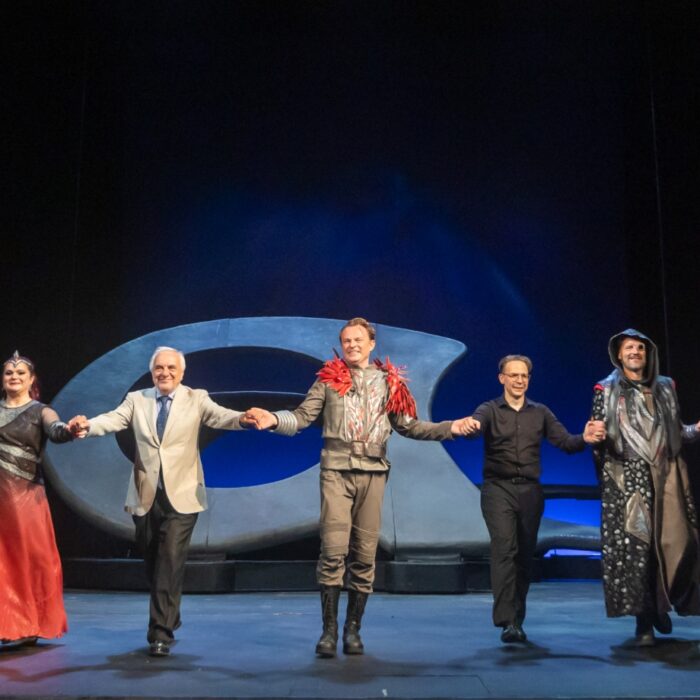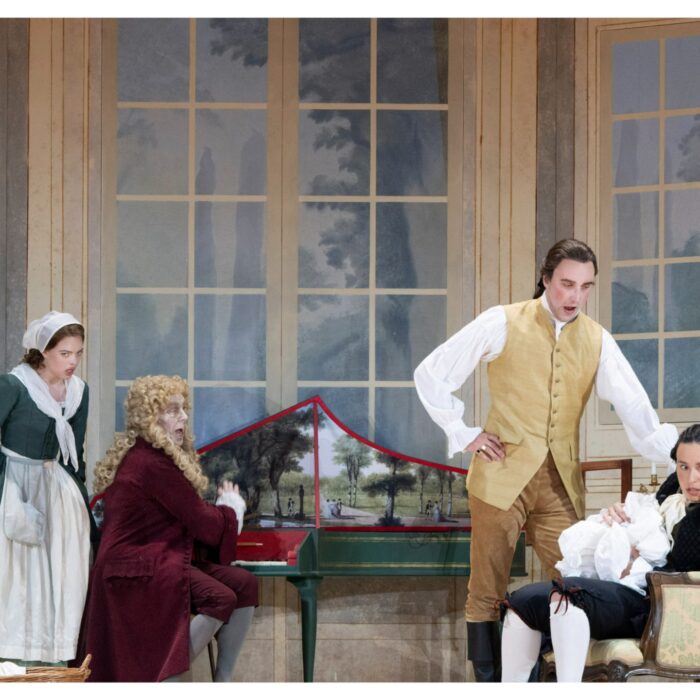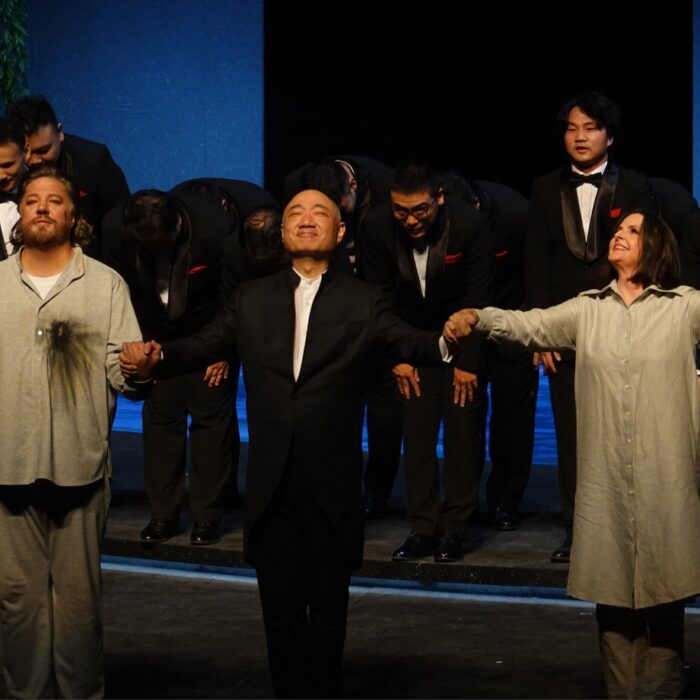
Metropolitan Opera Stars Live in Concert Review: Roberto Alagna & Aleksandra Kurzak in Èze, France
Famed Tenor & Polish Soprano Offer an Unforgettable Night at the Mediterranean
By Dejan Vukosavljevic(Credit: © Gregor Hohenberg)
The Metropolitan Opera Stars Live in Concert series continued this Sunday with a performance by the celebrated French-Italian tenor Roberto Alagna and Polish soprano Aleksandra Kurzak on the hilltop medieval village of Èze, France.
On the outdoor terrace located at the Château de la Chèvre d’Or, Alagna and Kurzak were accompanied by the Vienna Morphing Quintet. The Quintet is a part of the larger Morphing Chamber Orchestra, which was founded in 2006 by its artistic director, Tomasz Wabnic.
Right before the broadcast, the host, dramatic soprano Christine Goerke, was briefly joined by the Metropolitan Opera General Manager Peter Gelb. Gelb offered the explanation about the microphones that Alagna and Kurzak were going to wear, saying that the devices were not used to amplify the singers’ voices, but only to capture them in an outdoor setting.
Truth to be told, performing in such a setting is a huge acoustical challenge. The technical solution that was offered in this case was not a guarantee for a successful performance. However, Alagna and Kurzak proved completely up to the task, projecting their voices in a spectacular manner, which was clearly audible from the very beginning until the end. Technically, the performance had no weak spots whatsoever. The sound and the view were clear throughout the performance, and there were no technical blips of any kind.
The outdoor terrace in Èze offered a spectacular view of the Mediterranean. Per the words of Kurzak, it was a very hot and humid evening. However, those conditions did not seem to bother the famed duo as the evening progressed into a dreamy Mediterranean night.
Promising Start
Alagna and Kurzak opened the evening with the love duet, “Vogliatemi bene,” from Puccini’s “Madama Butterfly.” One of the most touching and moving duets in the whole operatic universe always calls for the special emotions brought by the singers onstage. The dynamic duo here again showcased the chemistry that makes them so special.
The Vienna Morphing Quintet offered a very inspirational performance, catching the true essence of Puccini’s music. Kurzak was soft and emotional, almost on the verge of fragility. Cio-Cio-San needs, after all, the carefully administered balance between the fragility and hope for the duet to work. It was clear that Kurzak fully succeeded in finding the balance – and that was a thin edge where even the best sopranos can stumble. But not Kurzak. Vocally superb, the Polish soprano shined all along.
Alagna promptly followed as the handsome and charming Pinkerton. He navigated the duet with warmth in his voice, finally giving in to the emotional display that encapsulated the evening’s opener.
The evening continued with the aria “Ah! lève-toi, soleil!” from Charles Gounod’s “Roméo et Juliette.” Alagna held the steady vocal line throughout the “Ah! lève-toi, soleil! Fait pâlir les étoiles,” and radiated a beautiful legato with “Qui, dans l’azur sans voiles, brillent au firmament.” The tenor also successfully rose to a closing top B flat with the last “parais.”
And then came the performance of the evening. Kurzak engaged in the cavatina “Una voce poco fa,” from Rossini’s “Il Barbiere di Siviglia.” The soprano offered up absolutely gleaming coloratura, leaving the viewer in shock and awe with the dazzling display of her vocal powers.
Kurzak navigated the richness of the aria with ease, balancing between the sweetness of young Rosina, and her devilish determination to get what she wants. Kurzak’s high notes were impeccable, and she rose to an absolutely magnificent top with the final “farò giocar.”
Then came the duet “Caro Elisir” from Donizetti’s “L’Elisir d’amore,” which brought more joy for the viewing audiences as the sun was slowly going on the horizon in Èze.
Alagna showcased more of his charismatic and youthful personality as Nemorino, with the opening lines “Caro elisir! Sei mio! E tutto mio …” He was in his element, successfully displaying the charming and seductive lover. Kurzak was again the Queen of the Night. Line after line in “Spezzar vorria lo stolido, gettar le sue catene; Ma gravi più del solito, pesar le sentirà,” she gave a humorous portrayal of a young Adina. Kurzak, in particular, played to the camera throughout this duet, adding to its dynamism and unpredictability.
In a sign of more incoming vocal pleasures, Roberto Alagna unleashed the true power of singing with Dick Johnson’s aria “Ch’ella mi creda libero e lontano” from Puccini’s “La Fanciulla del West.” The role is written for heavier tenor voices, something which Alagna, who has sung such roles as Canio in “Pagliacci,” and the title role in “Samson et Dalila,” is familiar with. His diction in this aria was perfect, and he gained more power with “Minnie, che m’hai voluto tanto bene! Ah! Tu della mia vita mio solo fior!” By the close of the aria, the tenor was giving it his all vocally, every phrase a cry of intense desperation. Overall, it was a successful account of a conman caught in the love despair.
The final performance of the first part of the concert was the duet “Tu qui, Santuzza?” from Mascagni’s “Cavalleria Rusticana.” Alagna is the very experienced performer of the role of Turiddu and his singing throughout displayed a sense of ease and confidence.
However, Aleksandra Kurzak again proved to be the supercharged voice during the evening’s performance. Her portrayal of Santuzza was gentle and emotional. She easily radiated despair and anguish, both vocally and dramatically. The duet was deeply touching coming from both performers and at its close, the two sank to the floor, fully engaged in the dramatic weight of the scene. It was one of those moments where their commitment was so immersive that it reminded you of all we’d been missing in these past few months.
A short break followed, and the cameras cut to the studio at the Metropolitan Opera premises and Goerke. The dramatic soprano gave a short account of recent joint performances by the couple at the Met, and the opera house included one clip with the duet “Parlez-moi de ma mère” between Don José and Micaëla from Bizet’s opera “Carmen.”
The Emotional & Spicy Finish
Kurzak opened the second part of the concert with the aria “Ave Maria” from Verdi’s “Otello.” The aria is a painful account of the deep inner cries of a woman unjustly accused of the marital betrayal. Desdemona sings and cries at the same time. Kurzak displayed exactly that profound emotional misery, bringing both planes to the surface – voice and the tears.
The soprano remained poised and fixed in one spot throughout, providing an exquisite vocal performance during the poignant aria. Few float high notes with such grace and ease as Kurzak, something that was on ample display throughout this aria, especially on the final A flat on “Amen.” It was fascinating to see how Kurzak can easily navigate through the deep and stormy waters, and then go back to the state of calmness only few moments after, and vice versa.
Alagna then joined his wife for the sensuous duet “Già nella notte densa.” This moment of the evening was perfectly chosen for this aria. Originally, Otello and Desdemona stand alone under the stars and recall how their love began. The evening in Èze provided a perfect background, as the evening stars already became visible. The Pleiades and the Venus began their cosmic dance.
Again, the chemistry between the two was an essential ingredient that gave the duet a very emotional flavor. The duo were both gentle and mildly melancholic, while their vocal storytelling was profound and utterly confident. Otello’s closing lines “Un bacio… ancora un bacio, alzandosi e mirando il cielo… Già la pleiade ardente al mar discende” provided a perfect end to the sublime performance.
The final three pieces in the program provided a much more joyful environment. The first of this set was the duet “Lippen Schweigen” from Lehár’s operetta “The Merry Widow.” “Lippen Schweigen – Love Unspoken” is a romantic waltz sung by the two main characters, Hanna Glawari and Count Danilo. Here Alagna and Kurzak sang in their native tongues, and it was a beautiful reminder how the duet can sound in other languages other than German.
Alagna and Kurzak then welcomed a trumpeter for the performance of Mendoza y Cortés’ “Cielito Lindo.” Alagna used a tambourine to add another joyful dimension for this rendition of the popular song. The performance was quickly spiced up with Alagna and Kurzak’s playfulness as the energy burst out of their voices.
The popular Neapolitan song “Funiculì, Funiculà” composed by Luigi Denza to lyrics by Peppino Turco brought the evening to an end. Kurzak played the spoons with gusto. The song came as Alagna and Kurzak’s final stamp on a successful performance in a dreamy environment of the Mediterranean.
A word for the camera and directing team, which has seen subtle improvement from performance to performance. Where the first performance in the series displayed a sense of visual improvisation and disorganization with constant cuts around the space at awkward musical moments, that was far less noticeable here. The camera remained locked on Kurzak in closeup or a crane-in throughout the “Ave Maria,” immersing us in her world without the distraction of an edit to wide shot at a random musical moment. Meanwhile, the more energetic cutting throughout the “Elisir” duet felt more like it was part of the plan when compared to a more patient approach throughout “Gia nella notte densa” or the “Cavalleria” duet.
In sum, this was by leaps and bounds the best performance of this series to date. Roberto Alagna and Aleksandra Kurzak offered up a night of unforgettable performance on the Mediterranean, with the truly sublime singing and acting full of irresistible energy. The choice of program also allowed for an ebb and flow that matched the shifting nature of the gorgeous environment.
The gravity of the evening fell on them entirely, and they dealt with it with supreme artistry.




